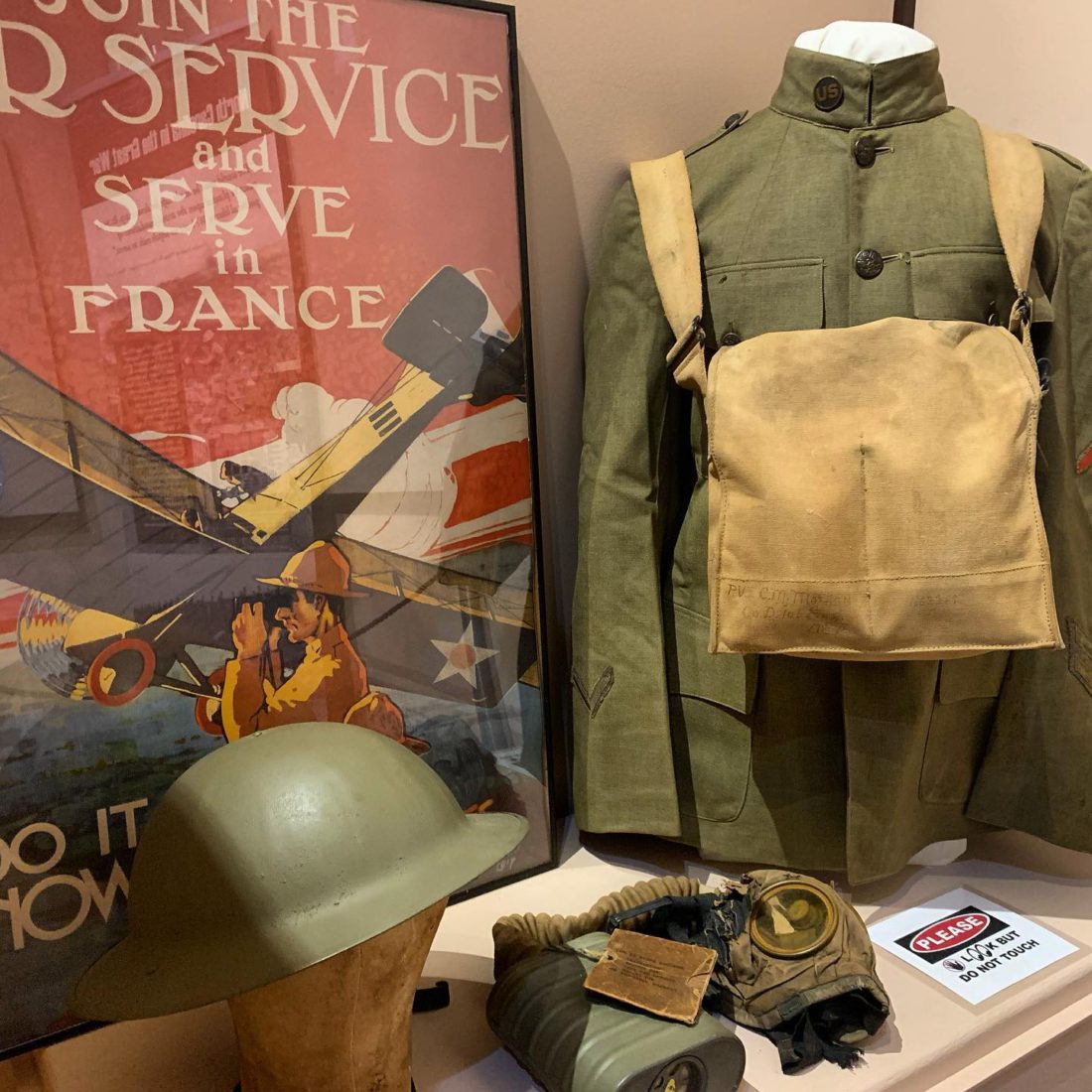Press release from the Western North Carolina Historical Association:
On Thursday, Feb. 13, from 4:00-6:00 p.m., the Western North Carolina Historical Association (WNCHA) at the Smith-McDowell House invites WNCHA members to an opening reception for their new exhibit “North Carolina in the Great War,” which explores state and local contributions to World War I through the stories of the men and women who served.
The exhibit is on loan from the North Carolina Department of Natural and Cultural Resources and has been supplemented with artifacts from the Smith-McDowell House collection. Entrance to the exhibit is included with Smith-McDowell House admission, which is always free for WNCHA members. The exhibit runs through Saturday, May 16.
The Smith-McDowell House Museum is open Wednesday-Saturday from 10:00 a.m.-5:00 p.m. Admission is $10 for adults, $5 for children and students 8+, and free for members and children 7 and under. Membership to WNCHA is $35 for an individual or $50 for a household and includes free admission to the house and exhibits, as well as discounts or free admission to WNCHA’s historic programs and events.
The Exhibit
The exhibit seeks to put the local men and women who served in context with the larger events happening in North Carolina, the United States, and the world. In the exhibit, visitors will find displays and interactive elements telling the stories of a few of our hometown heroes.Though the United States did not officially enter World War I until 1917, many men and women from western North Carolina fought with British and French forces soon after the war began in August 1914.
With the declaration of war by President Wilson in 1917, North Carolinians rallied to the cause. Women joined the American Red Cross, YWCA, and Salvation Army to serve as nurses in military hospitals at home and in France. Farmers grew victory acres and children grew thrift gardens to earn money to buy war bonds. Individuals and industry united to support the war effort.
Despite the bonds brought by patriotism during the war, segregation and the racism that precipitated it relegated African-American servicemen to segregated companies commanded by white officers. African-American troops also endured the added burdens of the Army’s discriminatory supply and pay policies.
Many Americans who fought in WWI joined via the newly-formed selective service. Cashus Melton Morgan was one such soldier.
Cashus Melton Morgan
Cashus “Cash” M. Morgan was born Feb. 9, 1893, in the Candler section of Buncombe County, to a farming family. Like most men born during the final decades of the 19th century, Cash was required to register for the selective service on June 5, 1917.Less than a year later, the 24-year-old was drafted into the army and sent overseas to fight. Though Cash did not become a decorated war hero like Hancock or Rockwell, his wartime experience is representative of most men drafted and sent overseas to fight.
“We began making dug outs – building Pill boxes – and putting up barb [wire] entanglement German shells were continually flying over our heads. We would have to fall in ditches and holes to get out of the way.”
On display in the exhibit is Morgan’s uniform, steel helmet, and gas mask – all put to great use during the young man’s time in the army. As visitors navigate through the exhibit they are invited to read excerpts from Morgan’s wartime diary chronicling the day-to-day drudgery of war until he is wounded and must try to survive through no man’s land on the Western Front.
The World War I exhibit acknowledges the 86,457 North Carolinians who fought in the war, and that North Carolinians were involved in all major battles on the Western Front in 1918. The toll was 828 killed, 3,655 wounded and 1,542 who died of disease, mostly from influenza.
The 1918 influenza epidemic impacted military personnel and civilians alike. Also featured in the exhibit are two nurses uniforms, one from the Asheville area, as well as stories of the nurses who cared for the sick and wounded in our area and abroad.
For more information, please contact Anne Chesky Smith, WNCHA Executive Director, director@wnchistory.org or 828-253-9231 or visit http://www.wnchistory.org/smith-mcdowell-house/current-exhibit/.




Before you comment
The comments section is here to provide a platform for civil dialogue on the issues we face together as a local community. Xpress is committed to offering this platform for all voices, but when the tone of the discussion gets nasty or strays off topic, we believe many people choose not to participate. Xpress editors are determined to moderate comments to ensure a constructive interchange is maintained. All comments judged not to be in keeping with the spirit of civil discourse will be removed and repeat violators will be banned. See here for our terms of service. Thank you for being part of this effort to promote respectful discussion.